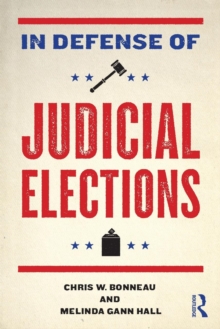
In Defense of Politicians : The Expectations Trap and Its Threat to Democracy Paperback / softback
by Stephen K. Medvic
Part of the Controversies in Electoral Democracy and Representation series
Paperback / softback
Description
Politicians are reviled. From jokes on late-night TV talk shows to radio show rants and from public opinion polls to ubiquitous conventional wisdom—politicians are among the most despised professional class in modern society.
Drawing on seminal work in political science, Stephen K.
Medvic convincingly argues to the masses that this blanket condemnation of politicians is both unfair and unwarranted.
While some individual politicians certainly deserve scorn for misjudgments, moral failings, or even criminal acts, the assumption that all of them should be cast in a similar light is unjustified.
More importantly, that deeply cynical assumption is dangerous to the legitimacy of a democratic system of government.
Politicians, as a class, deserve respect, not out of blind obedience to authority but because democratic deliberation requires it.
Medvic explains how cognitive biases in the way people reason often lead us to draw unjustified conclusions of politicians in general based on the malfeasance of some.
Scandals involving politicians are likely to be remembered and to serve as "evidence" of the belief that "they all do it." Most politicians, in fact, care deeply about their cities, states, and nation.
But they face a trap of unrealistic and contradictory expectations from the public about how politicians should behave.
Medvic, in turn, demonstrates the necessity of ambition, the utility of politics for resolving conflicts peacefully, and the value of ideology in framing political choices.
In the end, citizens must learn to tolerate the inherent messiness of politics as the only viable alternative to violent conflict.
In the process, we must embrace our role in the political system as well.
Information
-
Available to Order - This title is available to order, with delivery expected within 2 weeks
- Format:Paperback / softback
- Pages:202 pages, 1 Tables, black and white
- Publisher:Taylor & Francis Ltd
- Publication Date:17/12/2012
- Category:
- ISBN:9780415880459
Other Formats
- EPUB from £31.49
- PDF from £31.49
- Hardback from £115.00
Information
-
Available to Order - This title is available to order, with delivery expected within 2 weeks
- Format:Paperback / softback
- Pages:202 pages, 1 Tables, black and white
- Publisher:Taylor & Francis Ltd
- Publication Date:17/12/2012
- Category:
- ISBN:9780415880459










